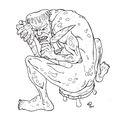Template:Selected anniversaries/May 14: Difference between revisions
No edit summary |
No edit summary |
||
| Line 53: | Line 53: | ||
||1928: Frederik H. Kreuger born ... engineer, author, and academic ... also a professional author of technical literature, nonfiction books, thrillers and a decisive biography of the master forger Han van Meegeren. | ||1928: Frederik H. Kreuger born ... engineer, author, and academic ... also a professional author of technical literature, nonfiction books, thrillers and a decisive biography of the master forger Han van Meegeren. | ||
||1944: David Christopher Kelly born ... scientist and authority on biological warfare, anthrax. Death by suicide. Pic. | ||1944: David Christopher Kelly born ... scientist and authority on biological warfare, anthrax. Death by suicide. Pic. | ||
Revision as of 22:45, 26 January 2022
1678: Writer and philosopher Culvert Origenes publishes Historia Culvertica, which will soon be widely plagiarized, influencing a generation of humanists.
1679: Astronomer and mathematician Peder Horrebow born. Horrebow will invent a way to determine a place's latitude from the stars.
1863: Mathematician John Charles Fields born. He will found the Fields Medal for outstanding achievement in mathematics.
1893: Mathematician Ernst Kummer dies. Kummer contributed to abstract algebra; in ring theory, he introduced the term ideal.
1893: Mathematician Ernst Kummer born. Skilled in applied mathematics, Kummer trained German army officers in ballistics.
1916: Physicist and astrophysicist Robert F. Christy born. Christy will be credited with the insight that a solid sub-critical mass of plutonium can be explosively compressed into supercriticality, a great simplification of earlier concepts of implosion requiring hollow shells.
1917: Mathematician, codebreaker, and academic W. T. Tutte born. During the Second World War, he will make a brilliant and fundamental advance in cryptanalysis of the Lorenz cipher, a major Nazi German cipher system.





